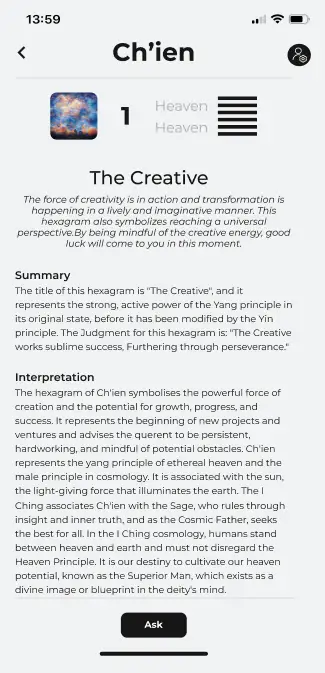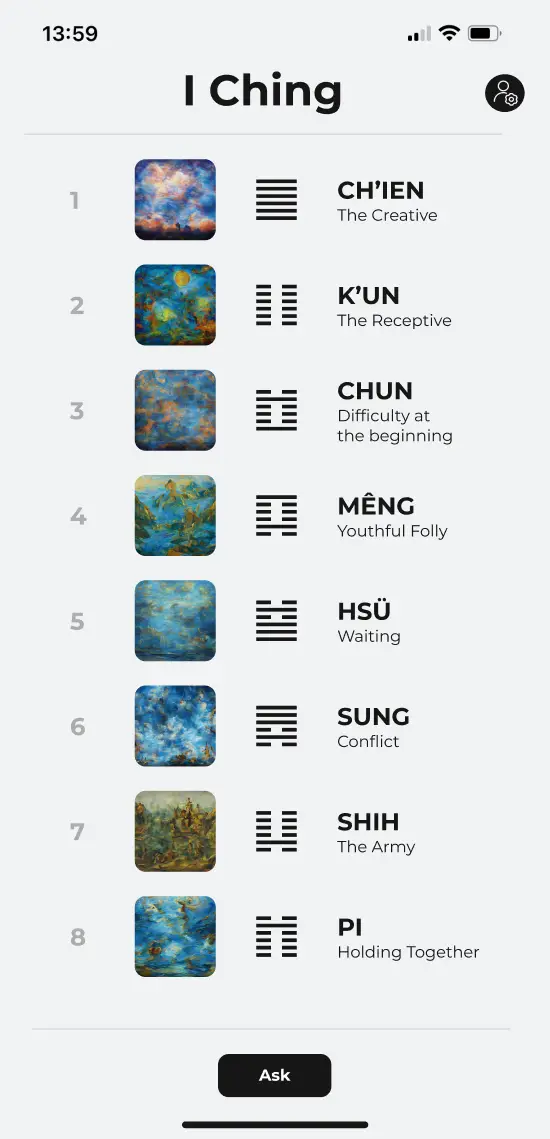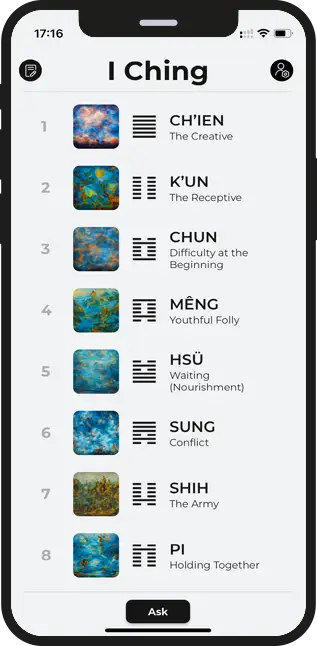
Heaven
Mountain
Hexagram 33 - Retreat - TUN
Avoid the temptation to analyse the situation and instead focus on taking a step back and retreating from it. This is a time for disengagement and finding inner stillness, where you can remain safe and beyond the reach of any potential harm.
Summary
This is about withdrawing from the world to find inner peace and avoid unnecessary confrontation. It is about taking time to reflect, recharge, and be content with one's company. The key takeaways from the judgment and image of this hexagram are that retreat is necessary for growth and that one should not be ashamed of withdrawing from society for a time.
Interpretation
The hexagram 33, "Retreat," offers valuable advice on the importance of disengagement and retreat, particularly when our ego, in the form of vanity, desire, or fear, is aroused. The hexagram emphasises the importance of maintaining consistency and perseverance to achieve long-term success. It advises against making hasty decisions or giving up too easily. Instead, it suggests staying the course, even during difficult times, and being willing to make small sacrifices in the present for future success. Additionally, it suggests being adaptable, being open to change and learning from experiences, and being humble enough to let go of old ways and embrace new ways of doing things.
The advice from the hexagram is clear - it is essential to disengage and cease going over the situation in our mind, to retreat before we become further involved. If we withdraw in time, we suffer no remorse because we will not have harmed the situation yet. Now we may retreat with little effort, but once desire or fear is aroused, we become entangled. Pride may also be aroused when we throw ourselves away at someone not ready to hear what we have to say. Once aroused, the negative effects of wounded pride are challenging to disperse; pride makes it difficult to return to the path of humility and acceptance. If we allow our ego to dominate the situation, we invariably go on to act even more inappropriately. Involving ourselves in this way causes reversals, humiliation, and remorse that can be avoided if we retreat at the earliest stage of becoming involved.
The correct time to retreat comes when we lose our inner equilibrium and serenity when we begin to feel enthusiasm, desire, or ambition, when others are no longer receptive, or when their delicacy of feeling wanes. Likewise, we retreat when we begin to be attacked by doubt and negation or when our actions no longer yield progress. If we have enough humility, we can observe these times and withdraw, not in disappointment, but in the realisation that times of influence are always brief.
Retreat is not the same as surrender, capitulation, or abandonment, which are desperate and unsatisfying measures. It is instead an acceptance and a choice: we calmly accept that the energies of the moment are against us, and we wisely choose to withdraw into the safety of stillness. In this dignified and balanced manner, we protect ourselves from negative influences and arrive rested at a more beneficial hour.
In ancient China, the idea of a retreat was often associated with a hermit or a reclusive scholar who would withdraw from society to gain a deeper understanding of the world and themselves. This idea of retreat is also present in various spiritual and religious traditions worldwide, where withdrawal from the world is seen as a necessary step in spiritual growth and self-discovery.
Sage Advice
Stay true to our principles and values, despite opposition or adversity. By maintaining a sense of inner stillness and calm, we can remain focused on what is truly important. This allows us to make decisions that align with our deepest values rather than being swayed by external pressures or demands. Remain humble, patient, and faithful to one's values. By disengaging from conflict and retreating when necessary, we can avoid the dangers of overreaching and maintain a position of strength and stability. Trust in the natural cycles of growth and decline, and have faith that success will come in its own time.
Line 1
Cautions against getting entangled in negative forces or situations threatening to throw us off balance. We may find ourselves lingering with negative elements due to our ego or emotional attachment. We must recognise the need to disengage entirely and retreat into stillness to avoid further harm or misfortune. This line speaks to the importance of recognising when our desires or fears lead us to negativity and conflict. It reminds us that by staying attached to the situation, we may be compromising our own well-being and sense of balance. We can regain our sense of inner peace and perspective by disengaging and allowing ourselves to enter a state of stillness and contemplation. Additionally, this line suggests that it is often easier to disengage and retreat from a negative situation when we do so initially before our ego becomes entangled and invested in the outcome. By recognising the importance of disengagement and retreating from the outset, we can avoid getting pulled into negative dynamics that are difficult to escape.
Line 2
Suggests that while we may desire justice, it cannot be demanded or forced through our ego. Instead, it must be obtained through the guidance and leadership of our higher self. The image of holding fast with yellow oxhide represents a firm yet gentle approach to dealing with inferiors. This suggests that while we may be in a position of power or authority, we must exercise this power with compassion and understanding. To obtain justice, we must stay true to our principles and persevere in disengaging from negative and ego-driven desires. This requires being aware of our ego and its tendencies and actively working to keep it in check. By doing so, we open ourselves up to the guidance and support of the Higher Power, which can help us to achieve justice and maintain a position of integrity and strength. The second line reminds us that justice and righteousness cannot be obtained through force or demands. Instead, they must be earned through discipline, perseverance, and the guidance of our higher selves. Only by remaining steadfast in our principles and disengaging from negative influences can we hope to achieve true justice and maintain our sense of inner strength and dignity.
Line 3
We see that the voices of our ego and those of others clamour on and on, making it difficult to disengage from the situation. However, we must retreat as best we can and avoid engaging in emotional struggles. We strengthen our willpower, dedication, devotion, and sincerity by doing what is right and focusing on the quiet truth. These positive elements of our personality serve as our servants in fighting off harmful factors such as doubt, anxiety, fear, pride, and vanity, which can lead to humiliation if left unchecked. Therefore, staying true to ourselves and maintaining our composure, even when facing difficult situations or challenging individuals, is essential.
Line 4
Emphasises the importance of disengaging from conflict and competition, as it only strengthens the opposing forces. By voluntarily retreating, we avoid humiliation and preserve our personality. This also allows us to defend ourselves against envy, anger, or hatred from others, as their egos lose power without our engagement. When we compete with others' egos, we only empower and solidify their resolve to continue the struggle. However, their resolve weakens when we disengage, leaving them with nothing to push against. The key is to find balance and maintain a sense of inner calm rather than engaging in a futile battle of egos.
Line 5
The text emphasises the importance of a friendly retreat with absolute firmness. It's essential to be determined and not let yourself be tempted to yield to ambition or impatience. The other person may try to engage you further, but it's essential to retreat immediately and refuse to participate in any harmful game. It's crucial to remember your responsibility to the Sage whom you serve and to respond sincerely only to sincerity. The truth needs neither promotion nor defence, and it can stand on its merits. Being friendly but firm and determined prevents you from being seduced into dangerous intrigues.
Line 6
Embracing retreat with joy brings good fortune. The decision to disengage from a negative situation can be a relief and a source of strength. When we retreat with lightness and optimism, we allow ourselves to move forward without being weighed down by negativity or bitterness. This attitude of cheerfulness and positivity can bring good fortune and positive opportunities in the future. Line 6 suggests that retreat can be a powerful strategy for dealing with negative situations, but it also emphasises the importance of doing so with the right attitude. We should approach retreat with joy and a positive outlook, and we are more likely to benefit from the experience. Rather than feeling defeated or discouraged, we can see retreat as an opportunity to regroup, recharge, and ultimately move forward in a more positive direction. This interpretation supports the idea that our attitude and mindset significantly shape our experiences. By cultivating a sense of optimism and joy, we can open ourselves up to more significant opportunities for growth and success.








